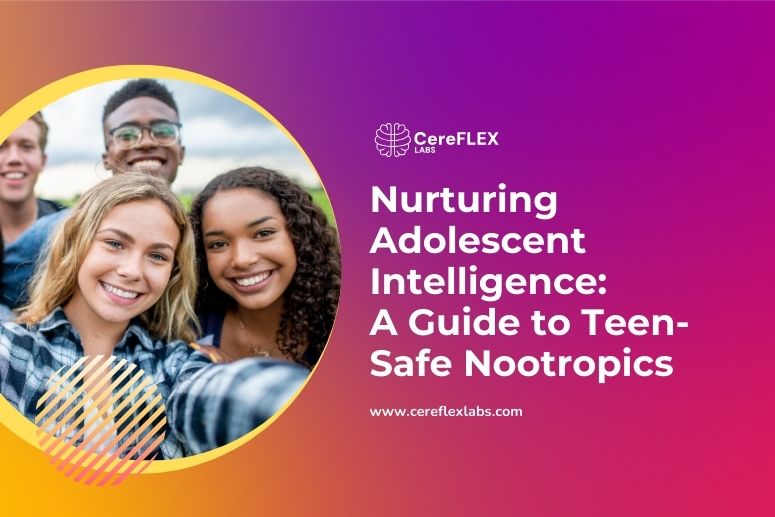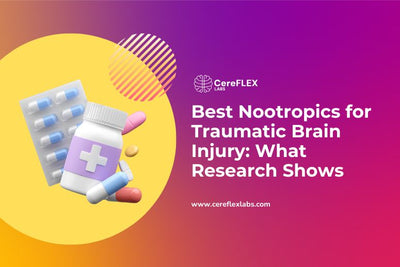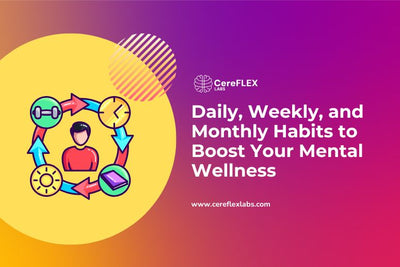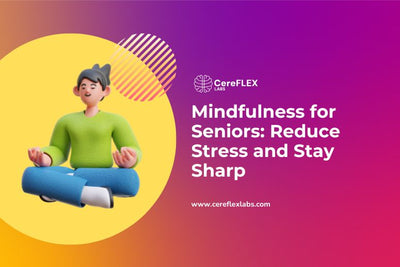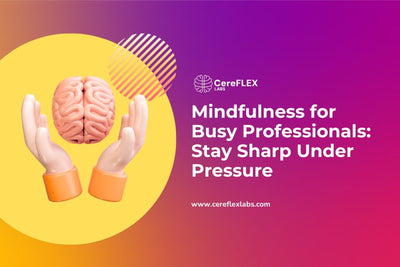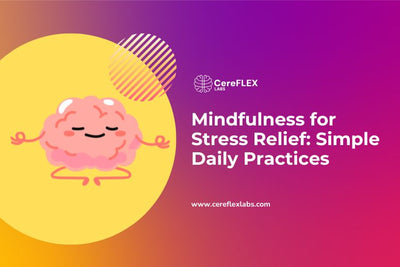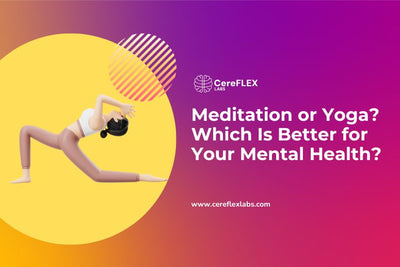Teenagers today juggle school demands, extracurriculars, constant screen time, and emotional ups and downs. It's no surprise that many parents, educators, and teens themselves are exploring ways to improve focus, clarity, and mental stamina.
One popular option is nootropics—substances that may support brain function. But when it comes to teens, safety matters most. A developing brain responds differently to supplements, and expert guidance is essential.
What are the safest nootropics for teenagers? Can they really help without harmful side effects? And are there natural, non-supplement options that work just as well?
This guide answers those questions using current research and a balanced, evidence-based approach. Our goal: to help support young minds safely, responsibly, and holistically.

What are nootropics and how do they work for teens?
Nootropics are compounds believed to improve brain function. They’re also known as “smart drugs” or “cognitive enhancers” and can be either natural or synthetic.
Some nootropics may support mental performance by enhancing:
- Focus and attention
- Memory and learning
- Mental clarity and alertness
- Motivation and mood
How do they work? Many affect key brain systems in the following ways:
- Regulating neurotransmitters like dopamine, serotonin, and acetylcholine, which influence mood, memory, and concentration
- Increasing blood flow to the brain, helping deliver oxygen and nutrients
- Protecting brain cells from oxidative stress and inflammation, which supports long-term cognitive health
However, not all nootropics are suitable for teens. While some natural options show promise, others may carry risks if used improperly or without supervision. Understanding which nootropics are both safe and age-appropriate is essential—especially during adolescence, when the brain is still developing.
Teen Brain Development
The brain grows rapidly in early childhood, reaching about 90 to 95% of adult size by age six. But development doesn’t stop there.
Throughout adolescence, the brain undergoes major changes. Unused connections in the grey matter are trimmed away, while important white matter pathways are strengthened to boost efficiency. This process supports learning, memory, and emotional regulation.
Crucially, the prefrontal cortex—the part of the brain that handles planning, decision-making, and impulse control—develops last. This area continues to mature well into the mid-20s.
Because it’s still under construction, teens often rely more on the amygdala, which governs emotion and instinct. This can influence how they react, especially under stress or pressure.
Why Caution is Crucial
A developing brain is more sensitive to external substances—including nootropics. Even supplements that seem safe for adults may affect teens in ways we don’t fully understand.
For this reason, it's vital to approach cognitive enhancers for teens with care. What helps focus today shouldn’t put long-term brain health at risk.
Always speak to a healthcare professional before starting any supplement. They can guide you through safe, age-appropriate options and help avoid possible interactions with medications or underlying conditions.
Supporting teen cognition means looking at the full picture—not just academic performance, but long-term well-being. That’s why safety, moderation, and guidance must come first.
What are safe nootropics for teenagers?
Not all nootropics are suitable for teens, but some natural cognitive enhancers show potential to support healthy brain development and cognitive function during adolescence.
Below are four well-known options with emerging evidence and generally strong safety profiles. Even so, they should only be used with proper guidance from a healthcare professional.

Bacopa Monnieri
Used in Ayurvedic medicine for centuries, Bacopa monnieri is known for its potential to improve memory and attention.
A review of five clinical studies found that it supported language development and short-term memory in children and teens. It also showed benefits for hyperactivity and attention span.
While results were modest, they were positive. Only 2.3% of participants reported mild side effects like upset stomach or dry mouth. Still, researchers noted that more studies are needed to confirm long-term safety for younger users.1
L-Theanine
L-Theanine is an amino acid found in green tea. It promotes calm focus without drowsiness and may help with stress, attention, and sleep.
In animal studies, L-Theanine helped protect brain regions from damage linked to adolescent cannabis exposure. It also improved dopamine balance in the prefrontal cortex—an area still developing in teens.2
These effects suggest it could support both cognitive and emotional health during adolescence. Human research is limited, but early findings are encouraging.
Omega-3 Fatty Acids
Omega-3s—especially DHA—are essential for brain growth and mental performance. These fatty acids help build brain cell membranes and support communication between neurons.
Research links Omega-3 supplementation in adolescents to better focus, learning, and emotional regulation. It may also support mood stability and reduce symptoms of attention difficulties.
Omega-3s are among the safest nootropic options for teens and are widely recommended by paediatricians and dietitians.

Ginkgo Biloba
Ginkgo Biloba is a plant extract that may help improve blood flow to the brain, supporting better alertness, mental clarity, and attention in teens.
Some research suggests it could be helpful for adolescents who struggle with focus but cannot tolerate standard ADHD medications. In one study involving teens with attention challenges, Ginkgo offered modest improvements with fewer side effects compared to stimulants.3
Though the benefits are less dramatic than prescription options, Ginkgo may serve as one of several alternatives to prescription stimulants for focus—especially for teens who are sensitive to traditional treatments or prefer a more natural approach. That said, it should always be used with medical supervision, particularly when other medications are involved.
Nootropics to Use Carefully
While some nootropics are generally safe, others can pose risks for teens—especially if used without guidance. A developing brain is more sensitive to certain compounds, making dosage and context critically important.
Here are two common nootropics that require caution:
Caffeine
Caffeine is one of the most widely used stimulants. It can increase alertness and improve reaction time, which is why it’s popular among students preparing for exams or pulling late-night study sessions.
However, too much caffeine can backfire. In teens, high intake—especially from energy drinks, sodas, or strong supplements—may cause:
- Anxiety or jitteriness
- Sleep disturbances
- Headaches or stomach issues
- Dependency over time
Sleep plays a major role in cognitive development. Since caffeine can interfere with sleep, it’s important for teens to monitor how much they consume and avoid it late in the day.
Prescription Stimulants (Adderall, Ritalin)
Medications like Adderall and Ritalin are approved for treating ADHD. When prescribed and monitored by a doctor, they can be highly effective and safe.
The problem arises when these drugs are misused—for example, taken without a diagnosis or used to boost academic performance. In teens, this misuse may lead to serious mental health effects, including:
- Irritability and mood swings
- Panic attacks and anxiety
- Insomnia or disrupted sleep cycles
- Risk of dependency or abuse
- Episodes of mania or even psychosis
These are powerful medications and should never be used casually or shared with others. If focus or energy is a concern, consult a healthcare provider about safer, age-appropriate strategies.
Potential Risks and Side Effects
Even natural nootropics may carry risks—especially for teenagers. “Natural” doesn’t always mean harmless, particularly when the brain is still developing.
A key concern is the lack of long-term research on nootropic use in adolescents. Most studies focus on adults, so we don’t fully understand how these substances might affect a teenage brain over time. What’s safe for a 30-year-old may not be safe—or effective—for a 15-year-old.
There’s also the risk of negative interactions. Teens taking medication for anxiety, ADHD, or other health conditions may experience side effects if certain nootropics are added to the mix.
Because the adolescent brain is more chemically sensitive, even mild shifts in neurotransmitters can affect mood, sleep, or focus in unintended ways.
For these reasons, it’s essential to consult a healthcare provider before starting any supplement. A doctor, pharmacist, or licensed nutritionist can help identify safe, age-appropriate options based on the teen’s specific needs.
Natural Ways to Boost Brain Power
Before turning to supplements, it’s worth remembering that everyday lifestyle habits play a huge role in teen brain health. These strategies are safe, accessible, and proven to support memory, focus, and emotional balance.
Here are four natural ways to enhance cognitive function—no pills or powders required:

Regular Exercise
Physical activity boosts blood flow and releases brain-supporting chemicals like dopamine and serotonin. Even moderate daily movement can improve mood, attention span, and mental energy.
Balanced Diet
The brain needs nutrients to function well. A diet rich in whole foods—like leafy greens, berries, nuts, fish, and eggs—helps fuel learning and focus. This underscores the importance of a balanced diet for cognitive function, particularly during adolescence when nutrient needs are high.
Enough Sleep
Good sleep is essential for memory, learning, and emotional regulation. Teens need 8 to 10 hours per night, but many fall short due to screen time or packed schedules.
More than just rest, sleep is when the brain resets and clears out waste. Quality sleep improves focus, problem-solving, and mood. It’s one of the most overlooked factors in how sleep affects cognitive development.
Tips for better sleep:
- Limit screen use before bed
- Avoid caffeine after 2 PM
- Stick to a regular sleep schedule
New Activities
Trying new things challenges the brain and builds new neural connections. This could be learning an instrument, switching up your routine, or exploring a new hobby.
Brain-boosting tips:
- Change your walking route now and then
- Cook something you’ve never made before
- Learn a new skill, even in short bursts
Conclusion
As interest in nootropics grows, it’s important to approach cognitive enhancement in teens with care. While some natural options—like Bacopa Monnieri, L-Theanine, and Omega-3 fatty acids—show promise, they should always be used with professional guidance and not seen as quick fixes.
Supplements may support attention or memory, but they can’t replace the basics: a balanced diet, regular movement, quality sleep, and a curious, engaged mind. These are the real foundations of long-term brain health.
For those exploring targeted support, there are a few options often considered among the best supplements for adolescent mental performance—but again, the key is choosing products that are age-appropriate, well-researched, and safe.
At CereFlex Labs, we focus on thoughtful, science-backed formulas designed to support healthy development—not just today, but for the future. If you’re looking for gentle cognitive support that aligns with your teen’s needs, we’re here to help you make an informed decision.
